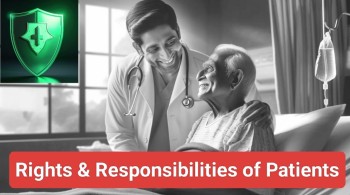The recent bust of an alleged international kidney transplant racket in Gurugram, India, highlights the critical need for public awareness about the Transplantation of Human Organs and Tissues Act (THOTA) 1994. This article aims to explain the act in a clear and concise manner, focusing on its core principles, guidelines for ethical organ transplantation, and precautions medical professionals should take to avoid such illegal practices.
Understanding the Transplantation of Human Organs and Tissues Act (THOTA)
The Transplantation of Human Organs and Tissues Act (THOTA), enacted in 1994, is a landmark piece of legislation in India that governs the ethical and transparent practice of organ transplantation. Here's a detailed breakdown of the act's core principles and provisions:
Core Principles of THOTA:
- Voluntary and Informed Consent: THOTA prioritizes the autonomy of both donors and recipients.
- Donor Consent: The act mandates that organ donation must be entirely voluntary. No coercion, undue influence, or financial incentive can be used to pressure someone into donating an organ. The potential donor must be fully informed about the entire process, including the risks and benefits of the surgery, potential complications, and the impact on their long-term health.
- Recipient Consent: Similarly, the recipient must also provide informed consent for the transplant procedure. They should be made aware of the compatibility factors, potential risks of rejection, post-operative care requirements, and the possibility of the surgery not being successful.
- Non-commercialization: THOTA explicitly prohibits the buying and selling of human organs. Organ donation is considered a selfless act of generosity, and any financial transaction associated with it is strictly illegal. This provision aims to prevent exploitation of vulnerable individuals, particularly those from economically disadvantaged backgrounds.
- Near Relative Priority: THOTA prioritizes organ donation from near relatives (spouse, parents, siblings, children) of the recipient. This prioritization stems from the higher likelihood of compatibility between blood relatives. However, the act recognizes that suitable organs might not always be available from near relatives.
- Non-relative Transplants: THOTA allows organ transplants from non-relatives under specific conditions:
- Authorization Committee Approval: Transplants from non-relatives require prior approval from the State Authorization Committee (SAC). This committee, comprised of medical professionals, social workers, and legal representatives, meticulously reviews each case to ensure it adheres to ethical guidelines and prevents exploitation.
- Established Relationship: A demonstrably established emotional bond between the donor and recipient is typically a prerequisite for non-relative transplants. This could be a close friend, a samaritan donor, or someone with a strong emotional connection to the recipient.
- Absence of Exploitation: The SAC scrutinizes the case to ensure there's no financial inducement or coercion involved in the donation.
- Brain Stem Death Recognition: THOTA recognizes brain stem death as a legal definition of death in India. This allows the possibility of organ donation from deceased individuals who are brain dead but have functioning vital organs. This provision significantly expands the pool of potential organ donors and offers a chance at life for many patients on transplant waiting lists.
Understanding the legalities of THOTA
THOTA is not just a set of principles; it's a legally enforceable act with strict penalties for violations. Offenses under THOTA can include:
- Removal of organs without consent: This is a serious offense punishable by imprisonment of up to three years and a fine.
- Commercial dealings in organs: Buying or selling organs attracts a harsher penalty of imprisonment up to five years and a fine.
- Fake documentation: Forging documents related to organ donation or authorization is a punishable offense.
- Violation of Committee Procedures: Bypassing the SAC approval process or failing to adhere to their guidelines can also lead to legal consequences.
Guidelines for Ethical Organ Transplantation: A Framework for Best Practices
THOTA establishes a framework for ethical organ transplantation, ensuring transparency and preventing exploitation. These guidelines are crucial for hospitals, medical professionals, and transplant teams to follow:
Registration and Authorization:
- Hospital Registration: All hospitals and medical institutions involved in organ transplantation procedures must be registered with the government authorities designated under THOTA. This registration process ensures hospitals meet specific infrastructure and expertise requirements for safe and ethical transplant practices.
- State Authorization Committee (SAC): THOTA mandates the establishment of a State Authorization Committee (SAC) in each state. This committee plays a pivotal role in overseeing and approving all proposed organ transplantations. The SAC typically comprises:
- Medical Professionals: Representation from transplant surgeons, nephrologists (kidney specialists), and other relevant medical specialties.
- Social Workers: Social workers bring in expertise on assessing potential for exploitation and ensuring informed consent from vulnerable populations.
- Legal Representatives: Legal experts ensure the proposal adheres to the legal framework of THOTA.
Pre-transplant Evaluation and Matching:
- Donor Evaluation: A thorough medical evaluation of the potential donor is mandatory. This includes a detailed medical history, physical examination, and psychological assessment to ensure they are mentally and physically fit to undergo the surgery without undue risk to their own health.
- Recipient Evaluation: The recipient also undergoes a comprehensive evaluation to determine their suitability for the transplant. This involves assessing compatibility factors like blood type, tissue typing (HLA matching), and overall health status to maximize the chances of a successful outcome.
- Matching and Compatibility: Blood group compatibility testing is essential to minimize the risk of organ rejection after the transplant. Additionally, for deceased donor transplants, tissue typing (HLA matching) helps identify the most suitable organ for the recipient, increasing the likelihood of long-term graft survival.
Informed Consent and Documentation:
- Consent Forms: THOTA emphasizes informed consent from both the donor and recipient. Clearly written and translated consent forms, explaining the risks, benefits, and alternatives to the procedure, must be signed by both parties.
- Detailed Documentation: Meticulous record-keeping is essential. This includes:
- Medical Records: Detailed medical records of both donor and recipient, including evaluations, test results, and surgical reports.
- Consent Forms: Signed informed consent forms from both parties.
- Committee Approvals: Documentation of approval from the State Authorization Committee (SAC) for the specific transplant procedure.
Transparency and Traceability:
- Transparent Process: The entire organ donation and transplantation process should be transparent and open to scrutiny. This includes clear communication with both donor and recipient families about the process and their rights.
- Organ Traceability: A robust system for organ traceability is crucial. This system tracks the organ from the donor to the recipient, preventing illegal practices like organ trafficking.
Additional Considerations:
- Post-transplant Care: Both donor and recipient require proper post-surgical care and follow-up. This includes monitoring for potential complications and ensuring access to necessary medications for the recipient.
- Counseling: Psychological counseling can be beneficial for both donors and recipients to address emotional challenges associated with organ donation and transplantation.
Precautions for Hospitals and Medical Personnel
- Strict adherence to THOTA: Hospitals and medical professionals must thoroughly understand and strictly follow THOTA guidelines.
- Verification of Documents: All documents related to organ donation and transplantation, including donor-recipient relationship and authorization certificates, must be meticulously verified.
- Scrutiny of Middlemen: Hospitals should avoid involvement with middlemen or agents who could facilitate unethical practices.
- Reporting Suspicious Activity: Any suspicion of illegal activity involving organ transplantation must be reported to the authorities immediately.
- Staff Training: Regular training programs for hospital staff on THOTA and ethical organ transplantation practices are essential.
The Importance of Public Awareness
Public awareness about THOTA empowers potential donors and recipients to make informed decisions. People should be aware of their rights and the legal framework surrounding organ donation. This can help prevent exploitation and ensure ethical practices.
Lessons from the Recent Case
The recent case in Gurugram exposes the vulnerabilities in the system. Allegations of forged documents, involvement of a middleman, and bypassing authorization processes highlight the need for stricter vigilance by hospitals and authorities. Additionally, it emphasizes the importance of educating both medical professionals and the public about THOTA.
Conclusion
Organ transplantation offers a life-saving opportunity for many patients. However, ethical considerations are paramount. THOTA provides a legal framework to ensure responsible practices. By understanding the act, adhering to its guidelines, and remaining vigilant, medical professionals can play a crucial role in preventing illegal organ trade and upholding the highest ethical standards in organ transplantation.












Recent comments
Latest Comments section by users
Guest
Apr 11, 2024
Article has explained the legal & ethical theoretical aspects. There r enough loopholes in implementing. Most of the explanations r only for living donation which will b useful only for kidneys & may b for livers.There is a large no of patients waiting for extra renal organ transplantations. A well structured & practiced deceased donor program will b the answer.
Guest
Apr 11, 2024
Article has explained the legal & ethical theoretical aspects. There r enough loopholes in implementing. Most of the explanations r only for living donation which will b useful only for kidneys & may b for livers.There is a large no of patients waiting for extra renal organ transplantations. A well structured & practiced deceased donor program will b the answer.